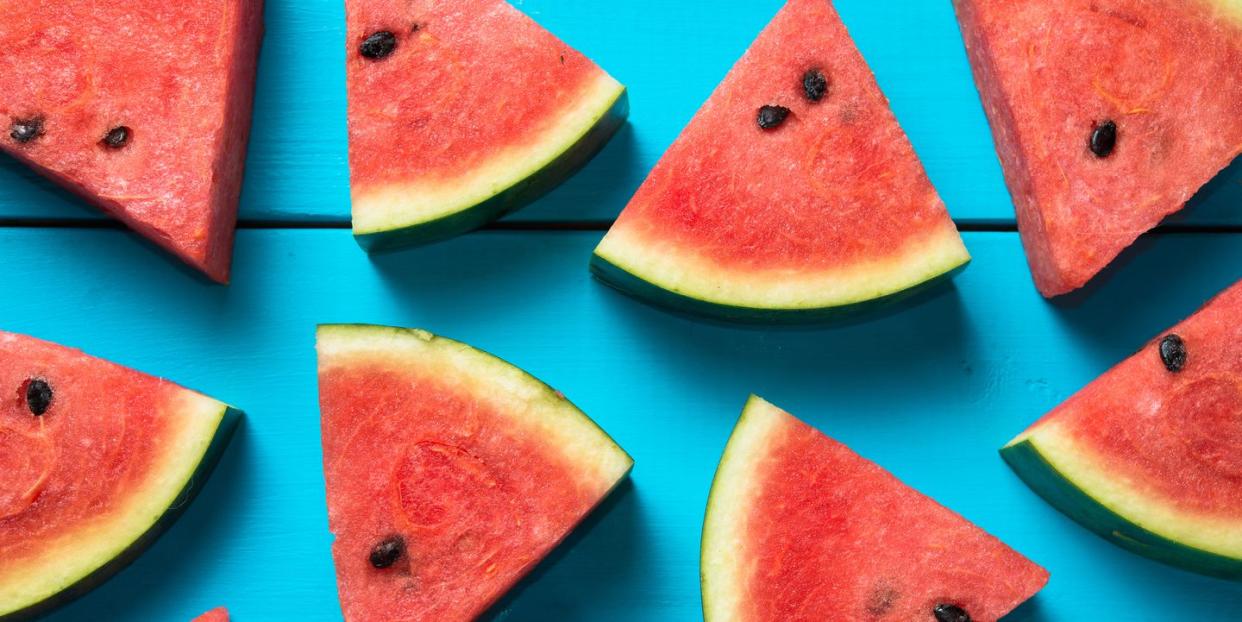5 Reasons You Should Reach for Watermelon After Your Next Workout

There are few things that scream “summer” more than a refreshing slice of juicy watermelon. But it turns out, you should actually be incorporating this hydrating fruit into your diet on the regular. The research shows that there are many benefits of watermelon we should take advantage of, so we tapped a dietitian to find out why you should feel good about grabbing some watermelon before or after your next workout.
Watermelon Nutrition
Watermelon is made up of mostly—you guess it—water, about 90 percent to be exact, which makes it a refreshing and hydrating treat. One serving of watermelon or about two cups of diced melon contains just 80 calories and 21 grams of carbohydrate.
While it does contain sugar (about 17 grams), this sugar, fructose, is naturally found in fruit which makes it a far better option than added or processed sugars, as it’s easier for our bodies to process and won’t spike your blood sugar as drastically as a bag of sour watermelon candy, for example.
The juicy fruit is also loaded with vitamins A, B6, and C, which boost your immunity, and potassium, which can potentially help ward off muscle cramps.
Health Benefits of Watermelon
While watermelon certainly tastes like a sweet and refreshing treat, there are five more reasons to sink your teeth into a slice for better health.
1. Improve Performance
Increasing your ability to use oxygen efficiently—upping your VO2 max—can help improve your performance. “Watermelon, like beets, contains nitric acid, which can improve blood flow and oxygen uptake,” says Lori Nedescu, R.D., marathoner and sports dietitian. Snacking on slices regularly could help your usual long ride feel a bit easier or make that last sprint burn a little less.
[Build a killer midsection in the kitchen for effortless miles on the road with Eat for Abs!]
2. Boost Recovery
“Post[ride] carbs are crucial for replenishing glycogen,” Nedescu says. With 21 grams of carbs per serving, watermelon is great for that. And we all know postworkout carbs are essential for recovery, but they can sometimes make you feel even thirstier, so reaching for a refreshing slice of watermelon after your next workout in the sun is a great way to rehydrate and re-up your stores.
Add a little protein, such as Greek yogurt, and you have a complete recovery option.
3. Alleviate Soreness
Watermelon juice is rich in the amino acid L-citrulline. One study, published in the Journal of Agricultural and Food Chemistry, found that drinking watermelon juice postworkout helped to lessen postexercise muscle soreness. Drink the juice straight or add the juice to your favorite smoothie recipe.
4. Fight Disease
The juicy fruit contains the antioxidant lycopene, which is usually associated with tomatoes. However, one study, published in the International Journal of Food Science and Technology, found that watermelon actually contains more of the antioxidant than a tomato. Filling up on watermelon—and lycopene—protects against inflammation and cell damage, which are known to lead to a higher risk of health problems including heart disease, some cancers, diabetes, and high blood pressure.
5. Increase Hydration
According to the USDA, a one-cup serving of watermelon contains about 140 milliliters (over half a cup) of water. Eating watermelon pre or postride can help you rehydrate, especially if you are someone who struggles to drink enough water throughout the day.
Creative Ways to Eat Watermelon
Watermelon Smoothie: Postride, simply blend up watermelon, ice (or freeze it beforehand), and milk. Adding a little mint of basil is optional.
Watermelon Salad: Combine chopped tomatoes and watermelon (both high in lycopene). Season with olive oil, balsamic vinegar, salt, pepper, and mint.
Cool off with a watermelon popsicle: Blend 1 cup of chopped watermelon with ? cup of coconut milk and a squeeze of lime juice. Pour in a popsicle mold and freeze. Alternatively, slice watermelon and stick a popsicle stick in each piece, then freeze.
You Might Also Like
